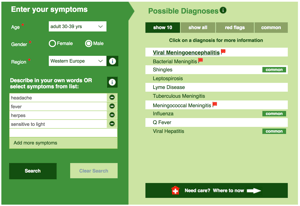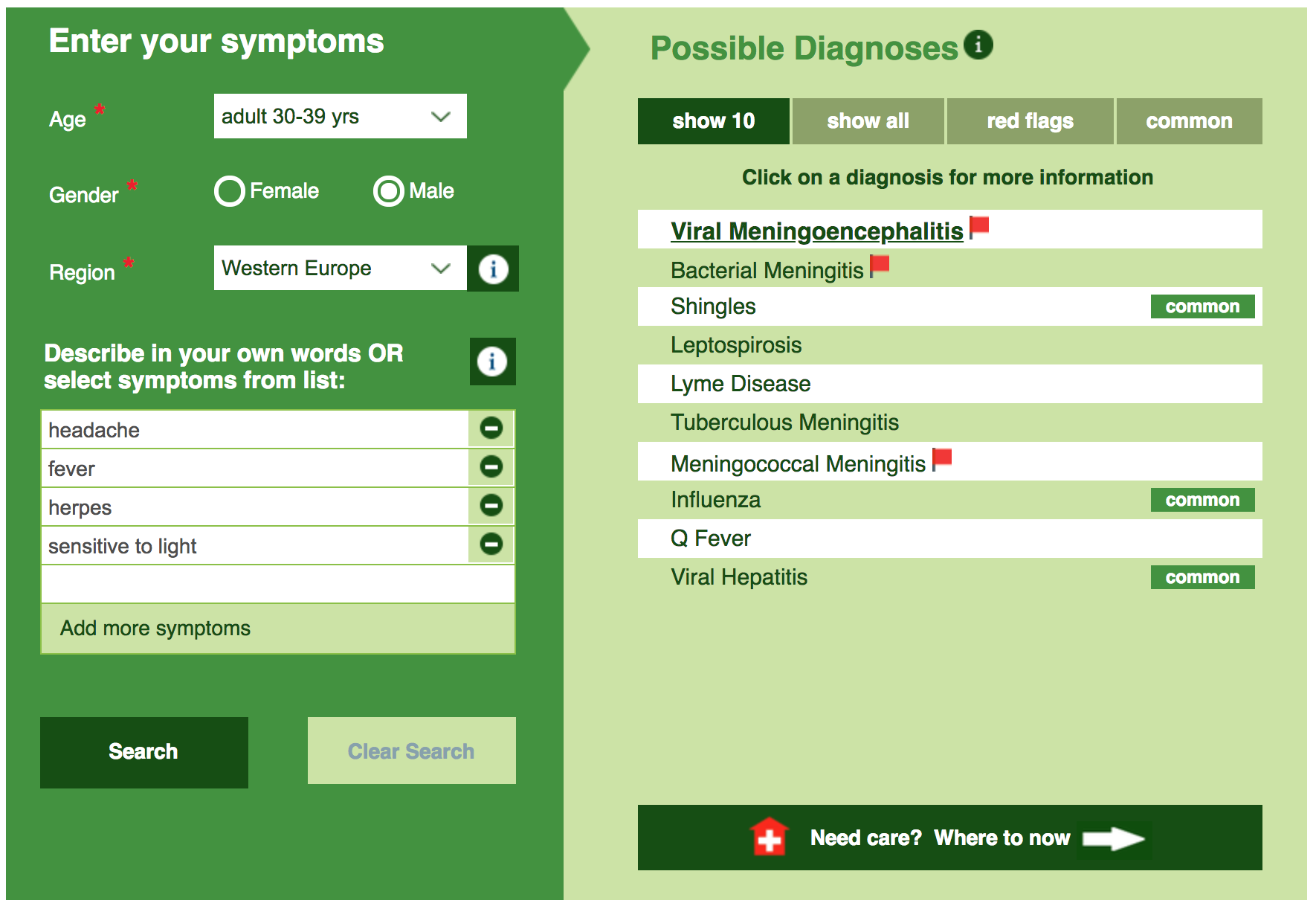- Privacy Policy
- Terms & Conditions
- Contact us
- ©Isabel Healthcare 2025
Could I have encephalitis? Symptoms, types and causes
 Encephalitis is a rare, acute brain disease which affects around 1 in every 200,000 people each year. Anyone can contract encephalitis, but it is most common in children, the elderly and those with a lowered immune system. There are many different types of encephalitis, and it is difficult to treat, meaning prognosis varies. Some people make a full recovery, others experience small changes to their brain, memory, mood or physical capabilities. For a small amount of people, encephalitis has a severe impact on their day to day life.
Encephalitis is a rare, acute brain disease which affects around 1 in every 200,000 people each year. Anyone can contract encephalitis, but it is most common in children, the elderly and those with a lowered immune system. There are many different types of encephalitis, and it is difficult to treat, meaning prognosis varies. Some people make a full recovery, others experience small changes to their brain, memory, mood or physical capabilities. For a small amount of people, encephalitis has a severe impact on their day to day life.
What is encephalitis?
The word comes from the Latin for brain encephalon and inflammation itis, and that is exactly what it is. The brain becomes inflamed as the body wrongly attacks the cells in the brain and spinal chord. The inflammation can last for a few days right up to several months. It can affect certain parts or the whole of the brain, and can range from mild to severe. Fixing the root cause of the encephalitis, and easing symptoms, are the main courses of action for treating this disease.
Types and causes of encephalitis
The different types of encephalitis correspond to the different causes. Little is known about the causes of some types of encephalitis, and research is always ongoing. We do know a little more about the most common type, viral encephalitis, although even here, there are still elements we do not understand.
Viral encephalitis
People already suffering with a virus can contract encephalitis when the virus manages to bypass the blood-brain barrier within the brain, which usually filters the blood going into the brain to keep out anything damaging. It is not known for sure how or why this is able to occur, but we do know that only certain viruses are able to get through the barrier and therefore cause encephalitis. Most cases of viral encephalitis are a result of the herpes simplex virus, and others include chicken pox, measles and german measles, to name a few. It is important to note, however, that having these viruses on their own does not mean you are likely to contract encephalitis - they are extremely rare cases. Treatment involves anti-viral medication, as well as treatments to help the symptoms, such as anti-epilepsy drugs to help with seizures and pain relief for headaches.
Tick-borne viral encephalitis
For those of you in the US, this is one to watch out for. Certain insects, including ticks and mosquitoes, carry viruses which can cause encephalitis, so any bites should be treated and watched over the coming days and weeks, to ensure encephalitis is not occurring. Bites should always be monitored, as there are many other diseases which are caused by bites, such as lyme disease.
Autoimmune encephalitis
This is an autoimmune disease, meaning the body unknowingly attacks a part of the body thinking it is a threat, and not much is known as to the reasons why. The body sees the brain or spinal cord as a threat, and attacks it, causing inflammation. Cases of autoimmune encephalitis are rare, but they are usually treated by trying to suppress the immune system temporarily to help the body return to normal.
Bacterial or fungal encephalitis
A very small number of cases are caused by a bacterial or fungal infection such as meningitis (particularly this one as it affects the meninges close to the blood brain barrier). These cases are treated with antibiotics.
Encephalitis symptoms
There are quite a few symptoms and some of them are common with many other conditions, so watching out for them can help get a diagnosis and treatment as soon as possible, leading to improved outcomes. First symptoms may not be severe and may be as simple as a headache, but if those symptoms do not go away or get worse, you should seek medical attention. You may experience some of the following symptoms:
- Severe headache
- Nausea
- Vomiting
- Fever
- Mild or moderate stiffness in neck
- Confusion and disorientation
- Changes in mood
- Double vision
- Speech problems
- Seizures
- Sensitivity to light
- Lack of physical co-ordination

Treatment and recovery from encephalitis
As detailed in each type of encephalitis, treatment can vary depending on the causes, but all will involve treatments to help ease symptoms such as pain and nausea. It can take days or weeks, or even months, but eventually the inflammation will reduce, and the most recovery happens in the first few months after this. At this point the brain will need to be assessed and monitored over time to determine any longterm effects. Many people return to normal life, perhaps with some small changes to their physical or mental abilities, and others will have more severe issues moving forwards. Because the disease affects the brain and central nervous system, these longterm effects can be almost anything, from physical limitations and speech problems, to psychological effects and changes in personality. Services are available for all longer term recovery and many people really benefit from these, going on to rehabilitate themselves into their new life. We have put some links to some great charities to help you if you or a loved one has been affected by encephalitis:
If you are concerned about your symptoms, particularly as the ones listed here can suggest a range of conditions, place your symptoms into the Isabel Symptom Checker and discuss the results with your doctor:

Mandy Tomlinson
Mandy has worked for Isabel Healthcare since 2000. Prior to this, she was a Senior Staff Nurse on the Pediatric Infectious disease ward and high dependency unit at one of London's top hospitals, St Mary’s in Paddington which is part of Imperial College Healthcare NHS Trust. Her experience in the healthcare industry for the past 33 years in both the UK and USA means she's a vital resource for our organization. Mandy currently lives and works in Scottsdale, Arizona.
Subscribe Here!
Recent Posts
Isabel DDx Companion with ChatGPT Integration - to help you diagnose even faster
At Isabel Healthcare, we’ve always been driven by one goal: to make clinical reasoning faster,..Virtual Triage: Do more questions lead to better patient outcomes?
One of the common misconceptions related to virtual triage / symptom checker tools is that the more..List Of Categories
- Differential Diagnosis Decision Support
- Differential diagnosis
- Symptom Checker
- Symptoms
- Medical Error
- Patient Disease Information
- Disease
- Clinical Decision Support
- Diagnostic Decision Support
- Isabel 1 Minute Read
- Diagnosis Error
- Diagnosis Skills Cases
- Healthcare Informatics
- Clinical Reasoning
- Evidence-based Medicine
- Medical Education
- Patient Engagement
- Symptom Triage
- Nurse Practitioner Education
- Nursing Decision Support
- Partnership
- Public Health
- COVID-19
- EHR
- Patient Empowerment
- Patient Safety
- rare disease

Start your FREE Trial today
Try the Isabel Pro DDx generator for 30-days - no payment card details required.




